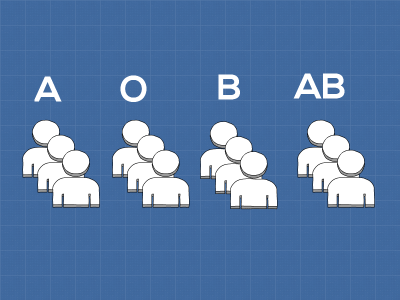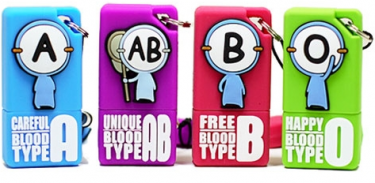Medically speaking, blood groups are a classification of blood based on the presence and absence of antibodies and inherited antigenic substances.
In the West, you might only hear about them when dealing with transfusions and such but (as a 2016 survey found out) 99% of the Japanese not only know their blood type, but 37% of them believe that it can affect their personality and that of people around them. Welcome to the world of...
Japanese Blood Type Personality Theory
In 1927, psychologist Takeji Furukawa was studying how to improve the entrance exam system of the girls' school he was working in at the time.He wanted a system that wasn't focused on academic abilities alone, but also took into account the personality of the candidates.
For that purpose, he studied the character traits of 11 people in his family, linked them to their blood types and published the results in a paper titled "The Study of Temperament Through Blood Type".
The theory quickly took off with the Japanese public (despite Furukawa's lack of credentials and the insufficient size of his "focus group") and was even investigated by the military government of the time as a tool for racial profiling (where certain countries would be deemed genetically "aggressive" or "submissive" based on their most common blood type).
The theory faded into obscurity in the 1930's and was only revived in the 1970's, through a series of popular books by Masahiko Nomi.
First ignored and then shunned by the scientific community, Masahiko and his son Toshitaka Nomi were loved by the media and spread the theory across music, TV shows and magazines until it became a common piece of popular culture.
Personality types
And in a world where no personal profile, from celebrities to Facebook users, seems complete without a blood type box it became natural for fiction writers to apply this element to their characters, first in manga and then in games. Let's review these types:

BLOOD TYPE A: the Well organized
- Dependable and self-sacrificing but reserved and prone to worry.
- Pros: Reserved, patient, punctual, and inclined to be perfectionists.
- Cons: Obsessive, stubborn, self-conscious and uptight.
People with blood type A have the strength to stay calm in times of crisis. They seek harmony and avoid confrontation, but are also shy and never really fit in with others. They are responsible and well organized, but also stubborn and get stressed out easily.
Picture hard-working, reserved Japanese farmers joining forces for the greater good and you are pretty closed to the idea.
As mentioned above, the system was devised in an era of strong nationalism, so it's not surprising that this almost ideal Japanese blood-personality group is shared by about 40% of the population.
In modern fiction, this led to some ambivalence towards this blood type. Sure, perfect, self-sacrificing heroes like Ryu Hayabusa (Ninja Gaiden), Chun-Li (Street Fighter), Leon S. Kennedy (Resident Evil) fit perfectly into it.But authors today prefer characters that are a bit less... square.
BLOOD TYPE O: the Optimist
- Decisive and confident
- Pros: Leadership, optimistic, creative, flexible.
- Cons: Forgetful, irresponsible, and self-centered
People with blood type O are outgoing, energetic and social.
They have leadership abilities and when they start a project, they focus their entire attention to it until the very end, even if it seems impossible.
At their best, they are passionate, active, doer, creative, and strong. At their worst, they are irresponsible, unforgiving, and tend to "go their own way".
They are the second "main" group in the Japanese population, with about 30% of the inhabitants
In fiction, they often work as confident outsiders, like Sakura Haruno (Naruto) and Ken (Street Fighter), or as a more relaxed and flippant kind of hero, like Sonic the Hedgehog or Ryo Hazuki (Shenmue)
BLOOD TYPE B: the Selfish
- Flamboyant free-thinkers but selfish
- Pros: Passionate, active, creative.
- Cons: Irresponsible, unforgiving, and individualists.
People with blood type B are known for their creativity. They have the flexibility and self-confidence to start new projects very easily, but they are also unreliable and flighty enough to drop them as easily.
They are less cooperative and like to follow their own rules and ideas. They pay more attention to their thoughts a little more than their feelings, and therefore can sometimes seem cold and serious.
With only 20% of the population, it's the first group to be perceived as an "outsider" in Japan, with even some theories tying its roots to ancient nomadic tribes.
In fiction, they are usually portrayed as brooding heroes like Solid Snake (Metal Gear) and Ryu (Street Fighter) or as detached sidekicks like Tifa (Final Fantasy 7) and Tails the Fox (Sonic)
BLOOD TYPE AB: the Eccentric
- Flamboyant free-thinkers but selfish
- Pros: Controlled, empathic, talented
- Cons: Eccentric, Two-faced, introverted
People with blood type AB are considered an a hybrid of A and B, two different personalities mixed together, so they can have characteristics on both ends of the spectrum at the same time. For instance, they are both shy and outgoing.
At their best, they are cool, controlled, rational, sociable, and adaptable. At their worst, they are critical, indecisive, forgetful, irresponsible, and tend to have a "split personality".
With only 10% of the Japanese population, they are the ultimate outsiders. But as rare as they might be in reality, modern fiction seems flowing with them. From Sasuke Uchiha (Naruto) to Knuckles the Echidna (Sonic) to an endless string of Final Fantasy protagonists (Lightning, Squall Leonheart, Cloud Strife...), our stories never seem to tire of these "heroes with a dark side".

In a nutshell
Most Japanese people really believe that their personality is dictated by blood? No, it's just a game, exactly like you pretend that it was Mars to break your umbrella yesterday.
Do all Japanese characters fall neatly into their blood-dictated stereotypes? Not really: as usual with archetypes, most of the fun is in updating, reinventing and even subverting them, and games are no different.
But it does help to learn them in order to know what the initial expectations are... and to be ready next time a Japanese will ask you about blood types
Sources
Japanese Blood Types: And What They Say About Your Personality
Understanding Videogame Characters in a Heartbeat: Japan’s Blood Type Theory and Videogames
Blood type personality theory